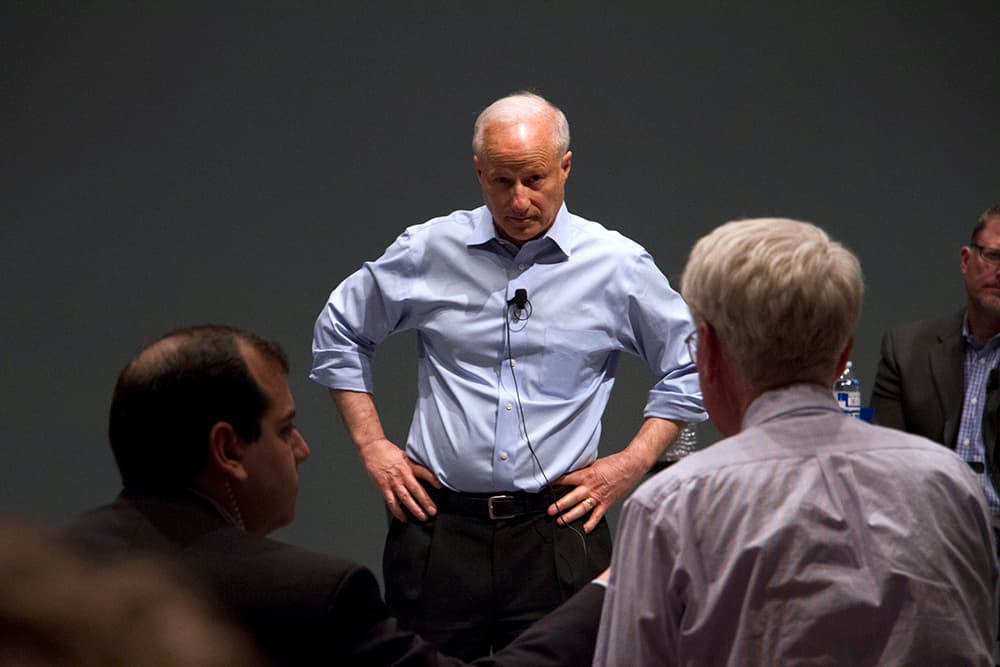
U.S. Rep. Mike Coffman was Colorado's only Republican "no" vote on the American Health Care Act, which passed the House 217-213 Thursday afternoon.
In Round 1, Coffman was that unusual political creature: a swing district Republican who saw enough good in the Republican health care bill to support it.
He never got to cast that vote, and as the vote approached on a revised version of the bill, Coffman announced a few hours beforehand that he did not support it.
"At this time, I cannot support the AHCA with the MacArthur amendment because I'm concerned that a small percentage of those with preexisting conditions may still not be protected," he wrote in a statement released on Twitter. "This does not take away from the fact that the Affordable Care Act is failing and American families are hurting."
Coffman added that he would not vote for a bill "of this magnitude" without a Congressional Budget Office score and without an estimated price tag. That's going to be a tough hurdle for most of the Republican proposals so far. The non-partisan CBO analyses that have been done haven't looked great, and leadership has pushed new proposals forward without a score rather than deal with the negative information.
The MacArthur amendment came from Rep. Tom MacArthur of New Jersey, a member of the Tuesday Group, a caucus of moderate Republicans of which Coffman is also a member. It sought to reassure hesitant Republicans that people with pre-existing conditions would still be able to buy insurance while allowing states to seek waivers for many of the protections that the Affordable Care Act implemented.
Just yesterday, Coffman seemed like he was leaning yes, though the pre-existing conditions protections were a hang-up. Coffman got an earful from constituents at a town hall last month who said they would die or become impoverished without those protections.
This was his full statement on Wednesday:
"Republicans promised to fix the Affordable Care Act mess, and we must. The current bill has a lot of strong elements -- giving the states more flexibility is sound public policy. Colorado knows better than Washington, DC and anyone who suggests otherwise hasn't been to Washington lately. But we need to tighten some protections for those with preexisting conditions. The critics of the House bill are being totally disingenuous when they say the bill dooms those with preexisting ailments. Individuals with preexisting conditions are guaranteed coverage under the House bill and I like the idea of giving the states flexibility to meet that requirement. But I worry that, under the current language, a small percentage of those with preexisting conditions may not be adequately protected. If House Leadership will work to tighten protections for those with preexisting conditions, I'm a yes on sending this bill to the Senate for further consideration. If not, I'm a no, and we’ll go back to the drawing board to clean up the mess created by the Affordable Care Act."
Coffman's shift reflects the difficulty House Republican leadership had in crafting a bill that will meet the demands of conservative Freedom Caucus members while not losing the support of more moderate members.
Even as House Republicans celebrated, Republicans in the Senate are expected to radically re-write the legislation, possibly taking out some of the provisions that earned Freedom Caucus support in the House. Some Republican senators, among them U.S. Sen. Cory Gardner of Colorado, have expressed concerns about rolling back the Medicaid expansion and not doing protecting people with pre-existing conditions.
Here's how Colorado's delegation voted:
- Diana DeGette (D): No
- Ken Buck (R): Aye
- Scott Tipton (R): Aye
- Jared Polis (D): No
- Doug Lamborn (R): Aye
- Mike Coffman (R): No
- Ed Perlmutter (D): No
This story has been updated throughout after the vote.











